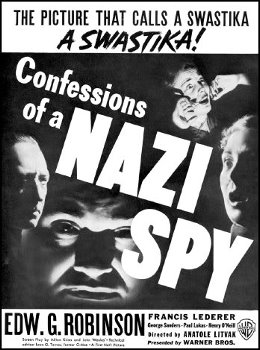
CONFESSIONS OF A NAZI SPY
US, 1939, 104 minutes, Black and white.
Edward G. Robinson, Paul Lukas, George Sanders, Francis Lederer, Henry O'Neill, James Stephenson, Sig Rumann.
Directed by Anatole Litvak.
Confessions of a Nazi Spy is a very interesting film to look at in retrospect. Made in 1939 by Warner Bros, it was hard-hitting in its highlighting of Nazism, Hitler's tyranny, the visuals of footage from Hitler's Germany, especially rallies, as well as highlighting the spy networks in the United States and the threat to world peace. It is an enjoyable and interesting propaganda film while it preaches, it nevertheless tells an interesting story well and has psychological involvement for the audience.
Paul Lukas is very effective as a German doctor imitating Hitler at American rallies. Francis Lederer is also very good as a self-centred ex-army officer who wants to be the champion Nazi spy in the United States. A short-cropped George Sanders has some vivid scenes as a Nazi. Edward G. Robinson plays an F.B.1. man with great authority. The film was directed by Anatole Litvak (The Sisters, All This and Heaven Too) and the film has all the marks of Warner Bros. '30s production. It is interesting now to think about the perceptions of the film on Europe in the '30s - and how correct it was.
1. A film of 1939, portrait of Nazism, international espionage, Nazi movements in the United States, the threat to the United States?
2. The impact in 1939, influence on American viewers? Vigorous and interesting propaganda?
3. Warner Bros. production values, black and white photography, studio sets? The voice-over and its comment, explanations, tone? The various collages of events, the use of newsreel footage from Germany, newspaper headlines for the Nazi invasion of Europe? Musical score?
4. The opening with Scotland, the innocent-seeming woman in Scotland - and her later being arrested? The transition to Dr Kassel and the rallies, his Hitler-like speeches, style and content? The audience and their response? Uniformed men? The ordinary citizens? Germans and their belief in the Fatherland, racial prejudice and superiority? Cassell and his message of hate? His loyalty to Germany - though later breaking? The irony of his difficulties with his wife, relationship with Erica? His practice, the network? His receiving the propaganda from Germany and distributing it? The contact with Schlager? The Gestapo and their contacts, inviting him to head the U.S. espionage? To become patriotic? The further rallies? His strong stances and statements? His conflict with other German personnel in America? His finally being exposed by Hildy, his collapse and confession? His being let go, the confrontation with his wife? His being taken by the Gestapo, back to Germany, the framed confession and denial? A collapsed man?
5. Schneider and his background, friendship with Werner, his wife? Zeal at the rallies? Writing to Germany, his ego? His commissions, getting Werner to get the document, persuading him? The phone information and its being delivered without question? Schlager and the interview, the $50? His wanting more money, his plan and his sending the letter to Scotland? His scheme for the passports, the phone call, the F.B.I. tracking him and arresting him? Renard and his interrogation, skill in flattering Schneider, his response and explanations? Identifying Hildy? on trial, Werner, his friendship, influenced by Schneider? The wife and her desperation?
6. Schlager and his speech on the ship, his control, the captain in fear? Hildy at the beauty parlour, information, reporting German citizens? The visit to Schneider, the interrogation? In the restaurant, dealing with the critics of national socialism? The propaganda? Hildy, the arrest, interrogation, the luggage and the code? Her identifying Kasse? The trial?
7. The widespread network, the meetings, the various workers in factory's, the diagram of the network and its links, the officials in Germany, their plans, sending agents into the United States? All the information and the way that it was used, for defence, for attack, weapons, etc? The film highlighting how every piece of information was valuable?
8. The glimpse of Hitler, Nazis, in 1937, its effect on Germany, the rallies, the blind faith of national socialists? The invasion of Austria, other European countries? The plans for disrupting American society, politics?
9. The F.B.I., Renard and his work as an agent, his skills, the arrest, flattering Schneider, his insinuations in getting the information? Interrogation of Hildy, of Kassel? The arrests and the trial?
10. The trial, the speeches of the attorney summing up the attitudes of the film-makers? The final conversation and warning with Renard?
11. Entertainment, propaganda, the vigour of Nazism in 1939, counter-espionage in the F.B.I? The film in retrospect?